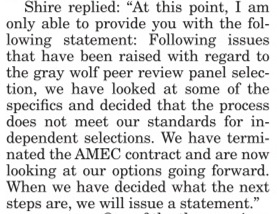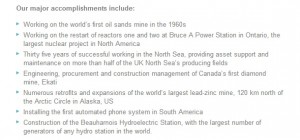I have worked on conservation issues through more than seven administrations and during that time I have known personally most of the directors of the US Fish and Wildlife Service. In nearly all instances these have basically been stand-up folks trying to do the best job possible under trying circumstances. With all of these directors, my experience has been that when I and others have asked them or their staffs a direct question they have answered directly. In a word, they have generally been "transparent."
Certainly there have been problems with incompetency and these were often dealt with poorly. But the politically motivated mischief has generally been kept to a dull roar by the agency or watch dog groups. A great example of that process in action was the firing of Julie McDonald at Interior during the Bush II administration when she basically let the timber industry write their own rules.
It is a system with a lot of slop in it, but that is really what we should expect in a democracy attempting to reconcile a menu of conflicting positions. What we should not expect is what we are getting now in regards to the scientific peer-review process for the wolf delisting process and the Service’s selection of AMEC as the consultant for this process (see above quote from Gavin Shire information officer at USFWS in Todd Wilkinson’s excellent piece). Badly done. Badly done, indeed.
We all make press statements on a number of topics, but generally they are meant to be explanatory rather than acting to make muddy waters all the more murkier. This is a CIA response rather than a USFWS, because it really acts to raise more questions than it answers.
And what are those questions? Who at USFWS or Interior thought it would be a whiz bang idea to hire a foreign, multinational corporation with roots in construction and natural resource development would be a good choice to hold the reins on a complicated process that first and foremost needs to embrace and hold science sacrosanct? How exactly is their expertise on developing tar sands applicable to wolf recovery and science (see AMEC listing of accomplishments above)? Who at AMEC or USFWS made the decision to jetison nearly half the peer-review team because they signed on to a letter than raised legitimate and well documented problems with the delisting proposal? Why was this core-element of the delisting process outsourced at all? And why didn't someone at USFWS or Interior not foresee this embarassing train wreck?
This is a complicated and difficult issue to navigate. Therefore it requires openess, professionalism and maturity. This action and all the associated elements of it lack all three of these characteristics. The USFWS needs to go back to the drawing board but they also need to police their culture to rebuild the damage to the public's overall trust of this most important of agencies.




The United States Fish And Wildlife Service: Putting Hunters Above The Welfare Of Wildlife And The Will Of The Public Since 1940.
Hopefully the backlash they're facing over this will make them think twice before pulling this stunt again.